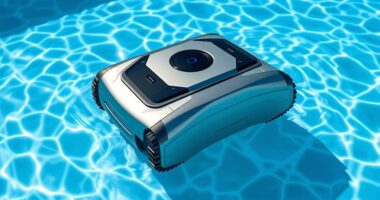Automatic pool cleaners efficiently cover large areas with minimal effort, saving you time and reducing manual labor, though they often come with higher upfront costs. Manual cleaners give you direct control and are cheaper initially but require more effort and ongoing supplies. Consider your budget, lifestyle, and how much time you want to spend on pool upkeep. Exploring the detailed pros, cons, and costs will help you make the best choice for your needs.
Key Takeaways
- Automatic cleaners offer convenience, thorough coverage, and time savings, while manual cleaning provides greater control and flexibility for spot cleaning.
- Robotic cleaners have higher upfront costs but lower long-term labor expenses, whereas manual cleaning involves ongoing supply costs and effort.
- Automated devices require minimal maintenance and are environmentally friendly, contrasting with manual methods that need regular supplies and more effort.
- Automatic cleaners suit busy or safety-conscious users, while manual cleaning appeals to those who prefer hands-on control and customization.
- A hybrid approach combines benefits of both, balancing convenience, cost, and cleaning effectiveness based on individual needs.
Comparing the Features and Effectiveness of Automatic and Manual Pool Cleaners

When choosing between automatic and manual pool cleaners, understanding their features and effectiveness is essential. Automatic cleaners, especially robotic ones, excel in robotic efficiency, covering large areas with minimal supervision. They navigate your pool independently, targeting dirt and debris effectively while saving you manual effort. These cleaners often come with smart features like programmable schedules and sensors that detect dirt buildup. In contrast, manual pool cleaners require you to physically scrub and guide them around your pool. While they demand more manual effort, they give you direct control over cleaning intensity and areas to focus on. Automatic cleaners offer convenience and thorough coverage with less effort, but manual cleaners can be more affordable and adaptable for spot cleaning. Your choice depends on your preference for effort versus automation. Additionally, considering home organization strategies can help you maintain your pool area more efficiently, reducing the overall cleaning workload. Proper maintenance routines can also extend the lifespan of your equipment and keep your pool cleaner longer. Incorporating regular cleaning schedules can further optimize your pool maintenance and ensure a pristine swimming environment. Regular equipment inspections can help identify issues early and prevent costly repairs, ensuring your pool remains in optimal condition. Moreover, understanding the variety of cleaning tools available can help you select the most suitable options for your specific pool setup.
Evaluating the Cost and Maintenance Requirements of Each Method

Automatic pool cleaners, particularly robotic models, tend to have higher upfront costs but often save money over time through reduced labor and maintenance needs. You’ll find that their efficiency can decrease your pool cleaning frequency, meaning less manual effort and fewer visits to your local pool service. When considering costs, equipment durability is key—robotic cleaners are built to last several seasons with proper care, lowering replacement expenses. Manual cleaning, on the other hand, involves ongoing costs for supplies like skimmers, brushes, and nets, plus the time you spend cleaning. While manual methods may seem cheaper initially, they can become more expensive over time due to the labor involved. Weighing these factors helps you determine which method offers better long-term value for your pool maintenance. Additionally, understanding cost comparison between these methods can help you make a financially informed decision. Moreover, choosing the right cleaning method can also influence your pool’s environmental impact, as automated devices typically use less water and energy over time. It’s also worth noting that the market value of robotic cleaners has increased as their efficiency and durability improve. Considering the regional regulations and available services in your area can further influence your choice of cleaning method. Incorporating energy efficiency considerations into your decision can lead to additional savings and sustainability benefits over the long term.
Making an Informed Choice: Which Pool Cleaning Solution Fits Your Lifestyle

Choosing the right pool cleaning method depends largely on your lifestyle and how much time you’re willing to dedicate to maintenance. If you prioritize pool safety and energy efficiency, automatic cleaners often save time and reduce manual effort, ensuring consistent cleanliness with less effort. Manual cleaning gives you control but demands more time and effort, which might be suitable if you enjoy pool maintenance. Consider your daily routine and budget before choosing. To help, here’s a quick comparison:
| Feature | Automatic Cleaner | Manual Cleaner | Hybrid Approach |
|---|---|---|---|
| Pool Safety | Consistent cleaning, reduces hazards | Relies on user diligence | Combines benefits, safer |
| Energy Efficiency | Less energy consumption | Higher energy use | Varies depending on use |
| Time Commitment | Low | High | Moderate |
| Maintenance | Minimal | Regular, thorough cleaning | Balanced |
| Cost | Higher upfront | Lower initial cost | Mid-range |
Choose based on your lifestyle for ideal pool maintenance.
Frequently Asked Questions
How Long Does Each Cleaning Method Typically Take to Clean a Pool?
Cleaning time varies depending on the method you choose. Manual cleaning usually takes about 1-2 hours, depending on pool size and debris. Automatic cleaners are more efficient, often completing a clean in 1 hour or less, making them a time-saving option. For an efficiency comparison, automatic cleaners generally save you time and effort, especially with regular maintenance, while manual cleaning offers more control but takes longer.
Which Pool Cleaner Is More Environmentally Friendly?
You want to choose an eco-friendly pool cleaner, so consider options that minimize chemical usage and energy consumption. Eco-friendly options like solar-powered or manual cleaners reduce electricity use, while models with efficient filters lessen chemical reliance for clearer water. Both automatic and manual cleaners can be environmentally friendly if you select models designed for energy efficiency and low chemical use, helping you maintain your pool sustainably and reduce your environmental impact.
Can Automatic Cleaners Handle Debris in Large or Irregularly Shaped Pools?
You wonder if automatic cleaners can handle debris in large or irregularly shaped pools. Generally, their effectiveness depends on your pool size and debris complexity. For bigger pools, some models might struggle, especially with complex debris. Irregular shapes can also pose challenges for navigation. To guarantee thorough cleaning, choose an automatic cleaner designed for your pool’s size and debris type, or consider manual cleaning for tricky areas.
Are There Safety Concerns With Manual Pool Cleaning?
You should always prioritize safety when manually cleaning your pool. There are hazards like slips, falls, or electrical shocks, so using proper safety equipment—gloves, goggles, and non-slip footwear—is vital for hazard prevention. Be cautious around electrical outlets and pool equipment, and never work alone. Taking these safety precautions helps you avoid accidents and ensures a safer, more efficient manual cleaning process.
How Do Weather Conditions Affect the Performance of Each Cleaning Method?
Did you notice how weather impact can surprise you? Seasonal variation directly influences both cleaning methods. Heavy rain can wash debris into your pool, making manual cleaning more demanding, while automatic cleaners might struggle with extreme weather, like strong winds or freezing temperatures. Sunlight can also cause algae growth, requiring more frequent cleaning. Stay adaptable to weather changes, and you’ll keep your pool sparkling regardless of seasonal shifts.
Conclusion
Ultimately, your choice between automatic and manual pool cleaning hinges on your lifestyle and priorities. Will you embrace the convenience of automation or the hands-on satisfaction of manual cleaning? Think about long-term costs, effort, and how often you want to tackle pool maintenance. The decision isn’t just about today’s needs—it’s about what’s waiting beneath the surface, ready to redefine your pool experience. Are you prepared to make the move that could change everything?









